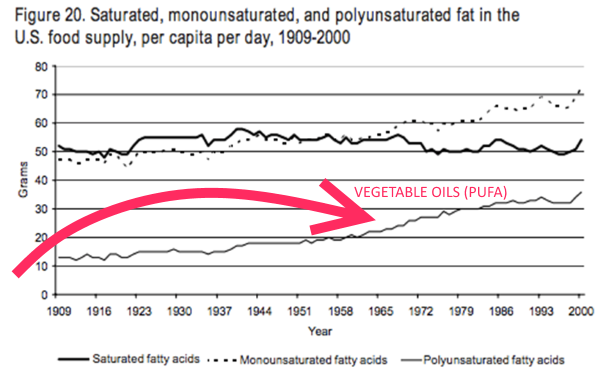The #1 Food You MUST Avoid to FIGHT Diabetes (hint: it’s NOT sugar!)
 If
you listen to mainstream medicine, I’m sure you’ve only heard that you
need to avoid sugar if you have diabetes or are pre-diabetic. But what
if I told that mindset totally misses the mark and ignores perhaps a
MORE important food that increases your risk?
If
you listen to mainstream medicine, I’m sure you’ve only heard that you
need to avoid sugar if you have diabetes or are pre-diabetic. But what
if I told that mindset totally misses the mark and ignores perhaps a
MORE important food that increases your risk?According to Dr. Ray Peat, PhD, “Diabetes is just one of the “terminal” diseases that can be caused by the polyunsaturated vegetable oils.” [1]
What does he mean by polyunsaturated oils? He’s speaking to any oils that have a large percentage of polyunsaturated fats, like:
- Corn oil
- Soybean oil
- Safflower oil
- Nut oils
- Canola oil
- Peanut oil
- Trans fats (artificially created)

- –Have a direct correlation to the increase of heart disease
- –Interfere with thyroid gland function– impairing the metabolic rate
- –Block hormone secretion
- –Can contribute to high cholesterol
- –Damage all systems of the body if in excess: hormone system, immune system & oxidative damage
- –Interfere with digestion
- –Decrease energy production
- –Block protein digestion in the stomach [2]
So what else can you do to help prevent diabetes? Take personal responsibility and change your diet. According to Dr. Peat, diet is key, “I think the basic anti-aging diet is also the best diet for prevention and treatment of diabetes, scleroderma, and the various “connective tissue diseases.”
This would emphasize high protein, low unsaturated fats, low iron, and high antioxidant consumption, with a moderate or low starch consumption. In practice, this means that a major part of the diet should be milk, cheese, eggs, shellfish, fruits and coconut oil, with vitamin E and salt as the safest supplements.” [1]
PIN IT:

{NOTE: Ray Peat, the person submitted the original post admits that some of the information in this post is attached to Paid Endorsements below-- Please use your judgement before acting upon anything that you read on the internet! ~~MKG} 
References:
[1] Peat, Ray. Diabetes, scleroderma, oils and hormones. 2006. Retrieved on 27 December 2014 from http://raypeat.com/articles/articles/diabetes.shtml
[2] Peat, Ray. Unsaturated Vegetable Oils: Toxic. 2006. Retrieved on 27 December 2014 from http://raypeat.com/articles/articles/unsaturated-oils.shtml
[3] Weston A. Price Foundation. The Oiling of America. 2000. Retrieved on 27 December 2014 from http://www.westonaprice.org/health-topics/the-oiling-of-america/
Photo Credit: Depositphotos.com/joruba75
No comments:
Post a Comment